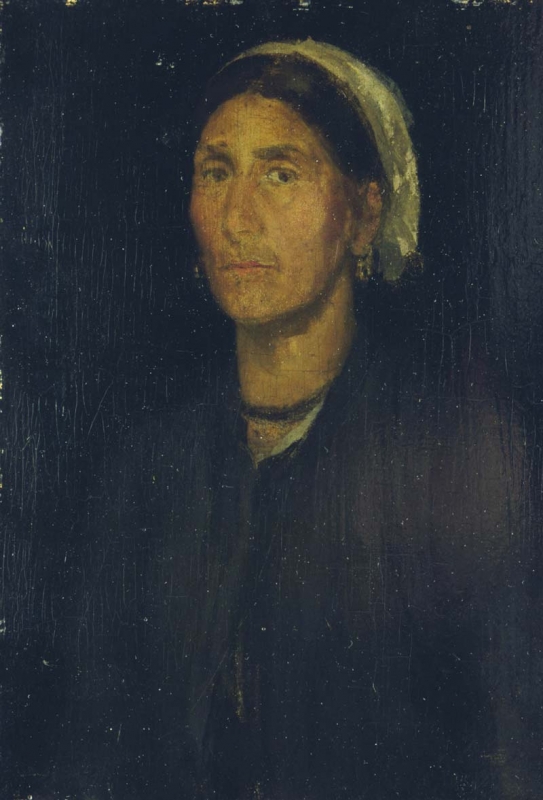Composition
Although the realistic approach is comparable to Whistler's other portraits of the late 1850s, particularly La Mère Gérard (1) [YMSM 026], it is painted far more thinly and carefully than other portraits, such as Whistler Smoking [YMSM 009], Portrait of Whistler with Hat [YMSM 023], and Head of an Old Man Smoking [YMSM 025]. Portrait of Major G. W. Whistler (2) [YMSM 029] comes closest in technique and in precision, but it is not as thinly painted and is probably not by Whistler!
Technically Head of a Peasant Woman is also comparable to some of Whistler's late panels, such as Gold and Orange: The Neighbours [YMSM 423] in its level of finish and treatment of paint.
It is not totally consistent with Whistler's known work but it is true that his early work can vary quite considerably in technique.
Technique
Traces of a graphite pencil outline can be seen around and on the head, where the paint is almost as thin as watercolour. It is on a 4-5 mm thick wooden panel, with a slight bevel on the verso, which has a vertical grain. This was prepared with a grey/buff ground, possibly over a white ground. 1
The light grey priming consists of lead white, chalk and bone black, in oil. The background has a light/mid blue underpainting in lead white and synthetic ultramarine in oil, absent from the dress. The black paint includes bone black and natural umber in lead white. According to Professor Joyce H. Townsend, the materials are consistent with Whistler’s materials. 2
There are signs of abrasions and possible reworking around the head, probably by the artist.
Conservation History
There are abrasions, which may be the result of cleaning. It was varnished by Harry Woolford, Edinburgh, in 1967, and has rather a thick and slightly discoloured glossy varnish. It is, however, structurally sound. 3
Frame
Modern, 37.7 x 30.2 x 3.5 cm.
There is a stamp on the verso, reading 'DOUANE / EXPORTATION / CENTRALE'; this may date from the painting's exhibitions in 1905. There is also an exhibition label on the verso, 'POTTIER, EMBALLEUR … 11, Rue Grillon, PARIS'.
Notes:
1: Condition report by Clare Meredith, 8 May 2001, Hunterian files.
2: Technical analysis carried out at the Natural History Museum EM Unit, London, for Professor J. H. Townsend, and report by J. H. Townsend, July 2017, GU WPP. She notes that the priming and underpainting have considerable lead soap formation, which makes these layers more transparent and makes the dark paint on top look less detailed and more transparent too.
3: Meredith, 8 May 2001, op. cit.
Last updated: 13th December 2020 by Margaret







